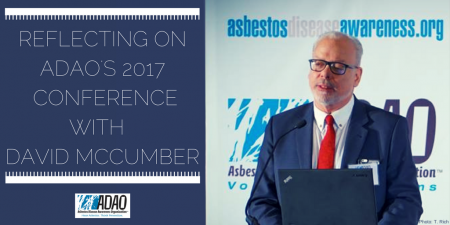How did it feel to present the keynote address at ADAO’s 13th International Asbestos Awareness Conference?
After spending many years writing about this issue, with Andy or in isolation, it was so rewarding to be with passionate, involved, committed people in this fight – including survivors, relatives of victims, and such an amazing range of professionals. It was AMAZING.
Can you briefly describe the conference from the perspective of a journalist?
It was like meeting your Rolodex – or the Rolodex you SHOULD have as a writer on this subject. I greatly value the personal and professional connections I made at ADAO and that’s one reason why I’ll be back whenever I can!
Did the current political climate influence the message of your presentation?
Absolutely. This issue should be non-partisan. It’s public health not politics. But the reality is that because of industry’s influence on politics it has become political. The recent fight over the Lautenberg bill (CONGRATULATIONS!) and current legislation that could totally change that hard-won beachhead, as well as things like the FACT Act, have made it political. And to have a President who doesn’t believe asbestos is dangerous – well, the reality of that is just shocking and it adds great urgency to the message.
In your presentation, you honored your professional partner Andrew Schneider, who we lost shortly before the conference. Andrew was also once an ADAO conference keynote speaker, revered, as you are, in the anti-asbestos community for his dedication to public health. Why was the asbestos issue so important for the both of you to take on so committedly?
I’ve been called stubborn in my professional life, and I’ve been accused of throwing too much at a story I believe in. But my level of stubborn is nothing compared to Andy. He literally never let go of a story. From the time we got involved with the Libby story forward, it was always clear to me that we would write about absolutely every aspect of the public-health threat that asbestos presents, in this country and worldwide. We came pretty close to doing exactly that together. He cared so much about all the people he met who have been touched by asbestos – I’ve never met a journalist who cared as much as he did. And one thing he taught me is that it’s okay to wear your heart on your sleeve if you’re campaigning to save people’s lives. We were both profoundly affected by this story – by the injustice, the corruption, by the human toll.
What is your message to budding investigative journalists on how they can help make the world a safer place, as you and Andrew have?
Don’t back off. Write the truth even when it’s inconvenient. Know that there’s nothing more important than telling such stories thoroughly and compellingly. No short cuts. And remember – if you don’t do it, who will?

